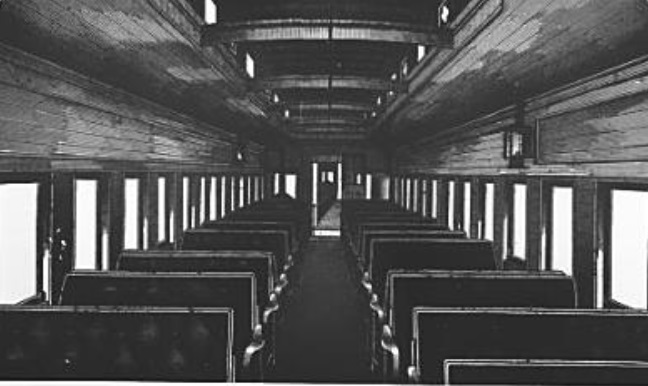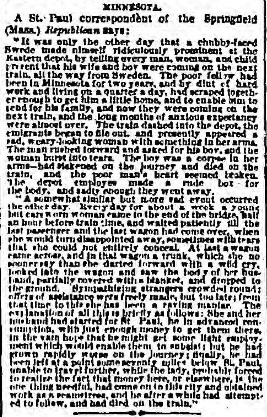
 These sad tales appeared in the Chicago Tribune 150 years ago today, September 20, 1869.
These sad tales appeared in the Chicago Tribune 150 years ago today, September 20, 1869.
MINNESOTA
A St. Paul correspondent of the Springfield (Mass.) Republican says:
It was only the other day that a chubby-faced Swede made himself ridiculously prominent at the Eastern depot, by telling every man, woman, and child present that his wife and boy were coming on the next train, all the way from Sweden. The poor fellow had been in Minnesota for two years, and by dint of hard work and living on a quarter a day, had scraped together enough to get him a little home, and to enable him to send for his family, and now they were coming on the next train, and the long months of anxious expectancy were almost over. The train dashed into the depot, the emigrants began to file out, and presently appeared a sad, weary-looking woman with something in her arms. The man rushed forward and asked for his boy, and the woman burst into tears. The boy was a corpse in her arms–had sickened on the journey and died on the train, and the poor man’s heart seemed broken. The depot employee made a rude box for the body, and sadly enough they went away.
A somewhat similar but more sad event occurred the other day. Every day for about a week a young care worn woman came to the end of the bridge, half an hour before train time, and waited patiently till the last passenger and the last wagon had come over, when she would turn disappointed away, sometimes with tears that she could not entirely conceal. At last a wagon came across, and in that wagon a trunk, which she no sooner say that she darted forward with a wild cry, looked into the wagon and saw the body of her husband, partially covered with a blanket, and dropped o the ground. Sympathizing strangers crowded round; offers of assistance were freely made, but too late; from that time to this she has been a raving maniac. The explanation of all this is briefly as follows: She and her husband had started for St. Paul, he in advanced consumption, with just enough money to get them there, in the vain hope that he might get some light employment which would enable them to subsist; but he had grown rapidly worse on the journey; finally, he ahd been left a a point some seventy miles below St. Paul, unable to travel further, while the lady, probably forced to realie the fact that money here, or elsewhere, is the one thing needful, had come on in this city and obtained work as a seamstress, and he after a while had attempted to follow, and had died on the train.
